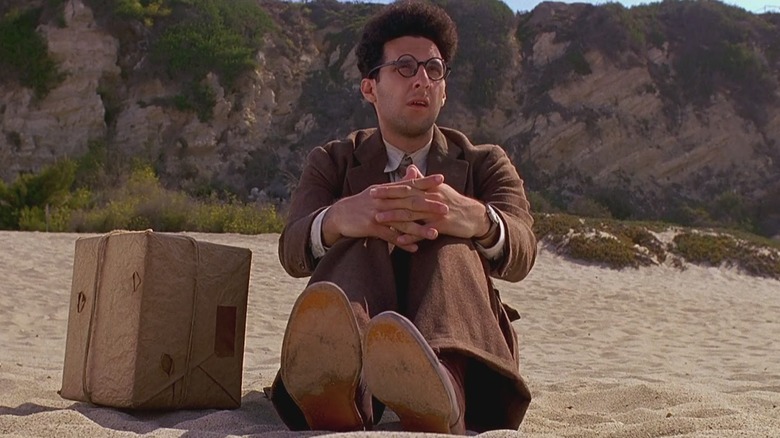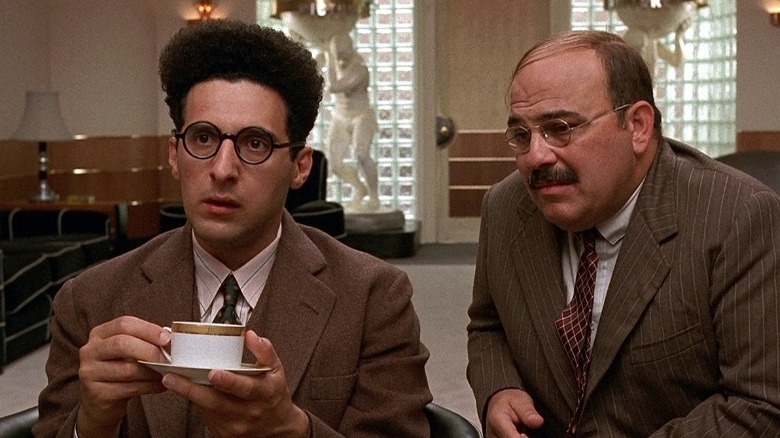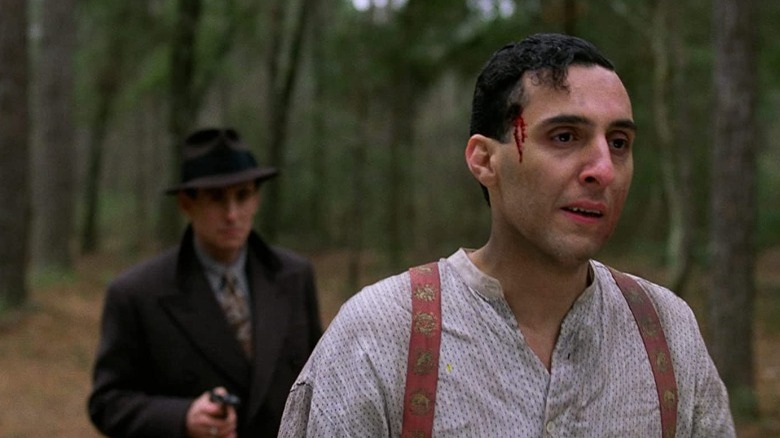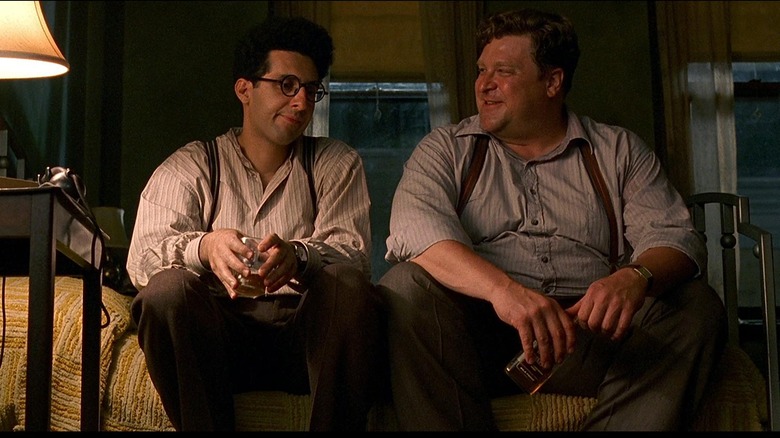The Coen Brothers Wrote Barton Fink Just To Break Their Writers' Block
The Coen brothers' 1991 film "Barton Fink" is a wonderful evocation of 1940s Hollywood in all its seedy glory and professional exploitation, but it's a magnificent and expressionistic glimpse into the mind's eye of a tortured artist (and possible hack) as he struggles with one particular screenplay. That was a feeling that the Coens knew well by the time they wrote it.
In "Barton Fink," the titular character (John Turturro) is a New York playwright newly arrived to 1940s Hollywood, handed a B-movie assignment for which he lacks the skills. For his residence, he chooses the ominous Hotel Earle. Tasked with writing a wrestling picture, he instead stares into his hotel's peeling wallpaper, living in such silence that all noise irritates him. The Coens use impressionistic technique to build out the depth of his writer's block — smash zooms onto blank pieces of paper, the cruelly loud banging of typewriter keys, symbolic dives down drains.
The clarity with which the brothers brought this feeling to life is no small feat, and it's proof they knew it well. After all, that same writer's block is what led to the writing of "Barton Fink."
Fink and the Coens
By the early '90s, the brothers had made three movies, with their cinematic instincts growing more sophisticated by the making of 1990's "Miller's Crossing." As writers, they were getting more ambitious, so much so that they would come to "lose themselves" in the wilderness of the gangster drama of "Miller's Crossing," as Joel Coen would say in a 1991 interview. If Barton Fink shared these problems with his creators, he shared more as well, as a man who struggled with maintaining an artistic voice in Hollywood. While the Coens would claim in that 1991 interview they had enough lucky breaks to not have many difficulties in the world of Hollywood filmmaking, their editor in those days, Michael Miller, would say otherwise.
In Adam Nayman's "The Coen Brothers: This Book Really Ties the Films Together," Miller suggested that the duo's early experiences in Hollywood were fed into the story of "Fink." As he said, "they would be offered... a 'Weekend at Bernie's' sequel to direct" while looking for a distributor for their 1984 debut "Blood Simple," the movie the brothers now consider their worst. Ultimately, though, even if the brothers and Fink didn't have everything in common, they did share Fink's gravest problem: finishing the script.
That came from the Coens' experience writing "Miller's Crossing."
Needing a break from a complex script
The Coen brothers have long enjoyed a reputation for the quality of their scripts, even for movies they didn't direct, like a long-forgotten Sam Raimi film and Steven Spielberg's "Bridge of Spies." "Miller's Crossing," with its wild array of double-crossing and backstabbing, demonstrates that quality to a fault.
"Miller's Crossing" is a familiar sort of Prohibition gangster saga, centering on an ethnic mob war between the Irish and the Italians, and the man who walks between them. The material is dense, literary in the way of many Coen films, with an intricate plot that couldn't be further from the fairly simple structure of "Barton Fink." Those intricacies created difficulties during the writing process.
Via Cinephilia And Beyond, a 1991 interview with Joel and Ethan Coen reveals that they conceived "Barton Fink" at some point during the scripting of "Crossing." In fact, as the writing for the gangster film dragged on, and their "working speed had slowed," the two needed a palate cleanser. That was "Fink," which could let them redirect their creative instincts. As Joel said, "to escape from the problems that we were experiencing with that project, we began to think about a project with a different theme." In essence, they needed to get away from the complicated crime story and into something more simple, something "narrower in scope."
Three weeks later
Not only was the narrative construction of "Barton Fink" more simple than that of "Miller's Crossing," its script took a mere three weeks to complete (versus the "nearly nine months" that "Crossing" required, according to Joel in the 1991 interview). While "Fink" was able to give the brothers the necessary distance to return to their earlier script and finally finish it, it was no throwaway exercise. In fact, /Film's official Coen brothers ranking puts "Barton Fink" numerous spots above "Miller's Crossing." No matter how much shorter its gestation time was.
As Ethan said in the 1991 interview, by the time they "had finished shooting 'Miller's Crossing,' we had a script all ready to film." That's a way to understate the potency of both films, which now reveal the extent of the Coens' artistry, even in the wake of frustration. The two crafted brilliant, wildly different films in the span of two years — and one of them is maybe the best cinematic portrayal of writer's block ever, very directly inspired by the real thing.



